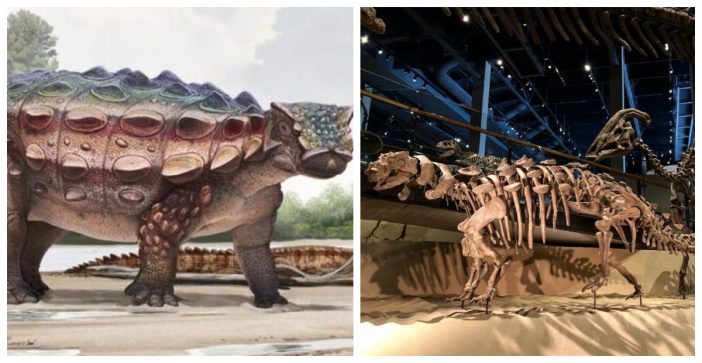
A newly discovered dinosaur fossil was found in Utah. What makes this finding so incredible is that it’s from a whole new genus of dinosaurs, called Akainacephalus johnsoni. This family of dinosaurs lived in the Cretaceous era, sometime between 100 and 66 million years ago. Back in 2008, researchers found smooth-armored fossils in the same area. This one was spiky.
After discovering this new genus, researchers focused on trying to figure out where this new dinosaur would fit into the family tree of Ankylosaurids. A fascinating conclusion, this dinosaur is not related to ankylosaurids found in western North America, but instead are related to Asian ankylosaurids, like Saichania and Tarchia.
New dinosaur alert!
Meet Akainacephalus Johnsoni, a herbivore from Utah. It's 76 million years old, and has bulbus armour across its head.
Ankylosaurid dinosaurs evolved initially in Asia, migrating to North America during low sea levels.
Read more: https://t.co/7mda2hlTz3 pic.twitter.com/bdn2KPxL7c
— ABC Science (@ABCscience) July 20, 2018
Randall Irmis, curator of Paleontology from the Natural History Museum of Utah, said, “A reasonable hypothesis would be that ankylosaurids from Utah are related to those found elsewhere in western North America, so we were really surprised to discover that Akainacephalus was so closely related to species from Asia.”
.@NHMU's very own Randy Johnson standing next to the new species of ankylosaurid #dinosaur, Akainacephalus johnsoni, after it was unveiled at the museum this morning. pic.twitter.com/s5GaZ7SCps
— NHMU (@NHMU) July 19, 2018
What all of this means is that there were at least two immigration periods that took place during that time in the Cretaceous period. What’s even more interesting is the mileage of migration that these dinosaurs made to end up in Utah!
https://twitter.com/LauraK9doc/status/1020024557980258304
“Not only is this the first described and named Late Cretaceous ankylosaurid dinosaur from Utah, but this unique animal also strengthens the evidence that distinct northern and southern provincialism existed during the late Campanian stage in Laramidia,” says author Jelle Wiersma.
"Almost every species of dinosaur discovered in the Grand Staircase-Escalante National Monument is new to science, including Akainacephalus." A new discovery in Utah reminds us that these national monuments need to be protected https://t.co/Y51CxjuRXE #fossils pic.twitter.com/g3df181Ueo
— Paige Madison (@FossilHistory) July 20, 2018
The fossil is essentially a complete ankylosaurid, in comparison to that of just a skull or vertebrae. It includes a complete skull, vertebrae, a complete tail and some parts of the front and hind limbs.
People on the Internet are finding this discovery pretty neat, too!
https://twitter.com/rodriguezTR14/status/1020397381135683585
It looks like some hardcore dinosaur experts are way excited!
HELL YEAH NEW ANKLYOSAURID BABEY pic.twitter.com/7ITh69q7lH
— 🍁Trinity! 🦡🍁 (@trinshutup) July 20, 2018
People are absolutely dumbfounded at the fact that we are still finding new fossils. There’s still so much more out there!
Yo I don’t ever wanna hear this isn’t dope. 2018, and new dinosaurs and animals we didn’t even know existed are being revealed and discovered. It’s always been a dream to go out there and hunt for fossils https://t.co/vk2sFKfWkR
— will i am not (@Willtheevans) July 20, 2018
Author Wiersma added, “It is extremely fascinating and important for the science of paleontology that we can read so much information from the fossil record, allowing us to better understand extinct organisms and the ecosystems they were a part of.”
Scientific illustration of Akainacephalus johnsoni by Andrey Atuchin @AndreyAtuchin pic.twitter.com/0kOitgiAsL
— NHMU (@NHMU) July 19, 2018
Be sure to SHARE this article if you found this 76-million-year-old dinosaur discovery interesting!
